An excerpt from the Annual Report of the Commissioner of Indian Affairs to the Secretary of the Interior for the fiscal year ending 1884, containing the annual report of the Carlisle Indian School. The report includes discussions of enrollment statistics, transfers, educational and industrial progress, student health, the school farm, donations…
Lincoln Institution
Also known as Educational Home
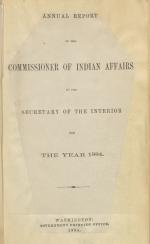
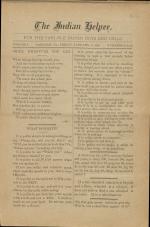
The first page opened with a poem titled “Smile Whenever You Can," followed by a lesson titled, "What Is Polite?" and a description of the life cycles of certain mammals. Page two featured the "Forty-Ninth Congress" civics lesson comparing government to the Indian school’s debating clubs in which Congress would be debating the question of…
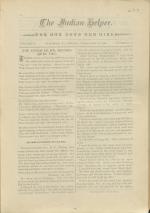
The first page opened with the poem, "You Conquer Me, Me Conquer You" followed by a letter from Rev. Edward F. Wilson of the Shingwauk Home titled "An Indian School in Canada," which described Wilson’s report to the Indian Department of Canada on his visit to Carlisle, the Lincoln Institute and the Hampton Institute. It continued on the last…
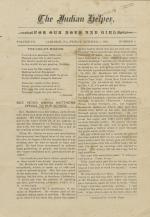
Page one opened with the poem, "The Child's Mission," followed by a report called "Rev. Peter Owaha Matthews Speaks to Our School," which was continued on the fourth page. It was the account of an assimilated Indian and the trials he overcame to become a successful, educated professional. Page two contained news of the literary and…
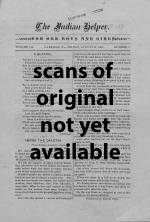
The first page opened with the poem, " A Proverb," followed by Jemima Wheelock's (Oneida) report of "Our Wilmington Trip," about a group of students traveling to Delaware where they stayed with families before they headed to Philadelphia with Capt. Pratt and Miss Leverett. They visited John Wannamaker's Store, the zoo, an iron factory and…
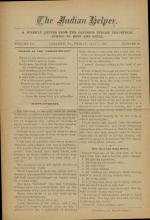
The first page opened with a poem "Legend of the 'Forget-Me-Not, '" "From the Scrap-book of a subscriber;" followed by an article called "Happy Accidents," about the importance of self-help. Next came a piece that continued on the fourth page entitled "How Boys Can Make Money." Page two began with the news of the death of Etahdleuh Doanmoe,…
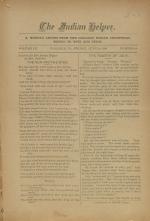
The first page opened with a poem selected “by Mrs. Pettinos,” titled “The Sun and the Wind,” followed by a conversation about the meaning of the 4th of July and how an Indian School student might be influenced to extend his time at the school instead of returning to the reservation. Page two included letters from Frank Lock (Sioux) on outing,…
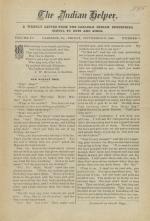
The first page opened with an untitled poem by J. W. Burgess reprinted from Sunshine, followed by “Our Walnut Tree” about the Man-On-the-Band-Stand’s efforts to keep students from picking green walnuts. The second page began with “The Captain,” which described the speech Capt. Pratt made during the student assembly explaining his work…
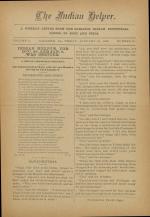
The first page opened with a notice that there were no Indian Helper newspapers published for December 28 and January 3rd. A notice followed: “A Novel Christmas Present: Our Superintendent Made with his own Hands a tin Cup for Each Employee.” Next was a poem, by “E.G.“dated Dec. 25, ’89 titled “The School Poet Again Stirred” about…
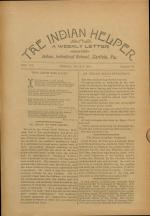
A description of this document is not currently available.
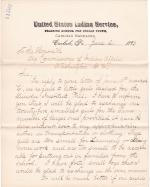
Richard Henry Pratt replies to a letter received from the Office of Indian Affairs regarding small girls to be sent to the Lincoln Institute in Philadelphia. Pratt notes that he would be willing to send a number of young girls at Carlisle to be sent to the Lincoln Institute along with young boys if it does not impact his budget.
Pratt…
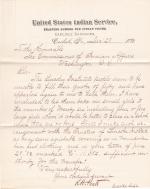
Richard Henry Pratt notes that the Lincoln Institute has appealed to him to help them fill their quota of students. As a result he proposes to transfer 26 girls including the small girls at Carlisle and four or five large girls who would be better served in a single sex school.
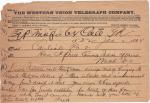
Richard Henry Pratt informs the Office of Indian Affairs that the Lincoln Institute wants 27 students. He also asks if there is any trouble with the reimbursement to his funds that separate vouchers be taken for the Lincoln Institute for those from Arizona which would cover orders from June.
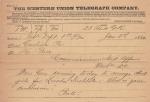
Richard Henry Pratt informs the Office of Indian Affairs that Mrs. Cox is coming to the Carlisle Indian School to arrange for transferring girls to the Lincoln Institute. Pratt asks for the conclusions from the Office of Indian Affairs about authorizing the transfer.
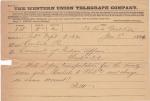
Richard Henry Pratt asks of the Office of Indian Affairs if he should pay for the transportation of 27 girls to the Lincoln Institute.

These materials include a cover letter and Descriptive Statements of Pupils regarding 27 children transferred to the Lincoln Institute in Philadelphia, Pennsylvania from the Carlisle Indian School. Those children, from a variety of Nations, had previously been sent to Carlisle.
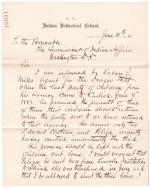
Richard Henry Pratt writes regarding a promise made by Laban J. Miles, U.S. Indian Agent, that three students would be returned with the party of the Osage students being sent home. Pratt writes that this promise should be fulfilled and asks that Peliza who is at the Lincoln Institute be transferred back to Carlisle and along with Edward…
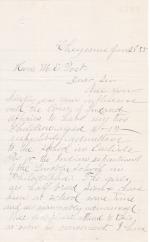
O. P. Goodwin requests from the Wyoming Congressional Representative Morton Everel Post for his daughters to be enrolled either at the Carlisle Indian School or the Lincoln Institute. Post forwarded the letter to the Bureau of Indian Affairs asking the request be considered favorably.
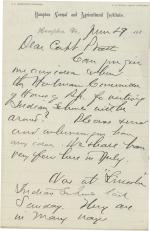
Samuel Chapman Armstrong of the Hampton Institute writes to Richard Henry Pratt asking if he knows when Representative Holman and his committee intended to visit Indian schools. Armstrong also shares his views from a recent visit to the Lincoln Indian School in Philadelphia.
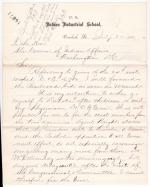
Notice of intent by Richard Henry Pratt that either he or the Carlisle Indian School physician Obadiah G. Given is set to visit the Rosebud and Pine Ridge Agencies to enroll 75 students. Pratt notes that due to students at Rosebud being sent to Genoa and Lincoln, in addition to the opposition to the Catholic Church, they are unlikely to enroll…
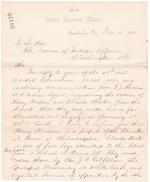
Richard Henry Pratt responds to an Office of Indian Affairs letter forwarding a letter from Agent T. J. Sheehan requesting the return of Charles Martin and Henry Hudson to the White Earth Agency. Pratt responds that Martin is a student at Carlisle while Hudson is a student at the Lincoln Institute (the Educational Home in Philadelphia). In…
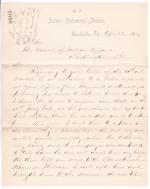
Richard Henry Pratt responds to the Office of Indian Affairs inquiry regarding Raymond Stewart's request to return home. Pratt notes that Stewart did not want to go home in January and so was placed in the outing program, which he was eventually forced to leave. After being returned to Carlisle he was put on trial and sentenced to remain at…
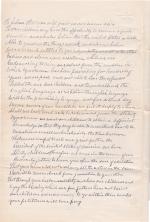
A group of members from the St. Regis band request from President Grover Cleveland to allow their children to be enrolled at the Lincoln Institute and the Carlisle Indian School. They cite that those schools will allow their children to better learn to speak English as well as a trade.
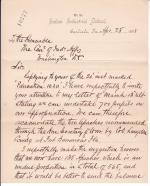
Richard Henry Pratt responds to an Office of Indian Affairs letter regarding a request from Colonel Loomis Langdon, commanding officer at Fort Langdon, regarding enrolling two Apache students at Carlisle. Pratt notes that he would be more than willing to accept the students but that Carlisle already has a disproportionate amount of Apache…
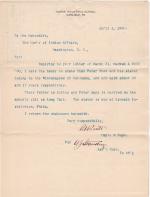
Alfred John Standing responds to the Office of Indian Affairs regarding Peter Snow and his sister. Standing provides information on the two students and notes that their father is listed on the annuity roll as Long Tail in addition to noting that Snow's sister is enrolled at the Lincoln Institute.
